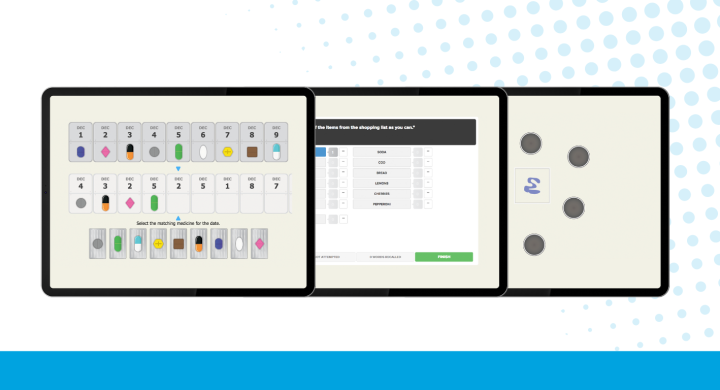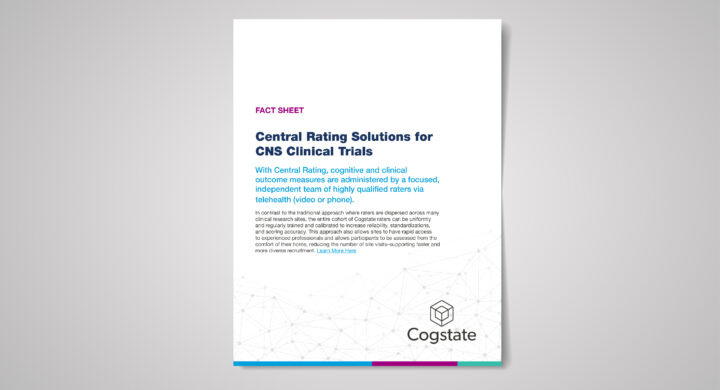The ADCS Preclinical Alzheimer’s Cognitive Composite (PACC) is one of the more frequently leveraged assessments to evaluate the impact of therapeutic candidates in preclinical AD clinical trials.
The term “PACC” refers to a set of neuropsychological tests that measure cognitive domains such as simple/complex attention, processing speed, and memory. These domains have been identified on the basis that they are those most commonly affected in very early AD.
A PACC provides a single and standardized composite cognitive score based on the contribution of the individual neuropsychological tests from different cognitive domains. PACC scores have been shown to have high sensitivity to AD-related clinical disease progression. They are sensitive to levels of tau and amyloid that increase as AD progresses within the preclinical stage and on to the early clinical stage of AD (e.g. mild cognitive impairment).
Within these batteries, the specific tests that provide the PACC score vary. Examples of PACCs used in landmark AD clinical trials include:
- Anti-Amyloid Treatment in Asymptomatic Alzheimer’s Disease (A4): Paragraph Recall, MMSE, DSST, and FCSRT
- Dominantly Inherited Alzheimer Network Trials Unit (DIAN-TU): MMSE, Rey Auditory Verbal Learning Test, DSST, Trail Making Test
- Generation Program: MMSE, DSST, FCSRT, Category Fluency Test
- Longitudinal Evaluation of Alzheimer’s Disease Prevention (LEARN): MMSE, Logical Memory Test (LMT), DSST, Trail Making Test Part B, Category Fluency Test
Complex Preclinical AD Assessments Need Endpoint Data Quality Assurance
While PACC neuropsychological tests may appear simple, there are many aspects that must be considered when they are applied in clinical trials.
For example, bedside mental status exams like the Mini-Mental State Examination (MMSE) or more sophisticated neuropsychological tests such as the Free and Cued Selective Reminding Test (FCSRT) are complex, nuanced, and require a high degree of clinical skills to achieve accurate, reliable, and valid test administration and scoring. Unless raters adhere strictly to the standardized procedures for test administration and scoring, variability and data errors can compromise the tests’ power to detect drug effects.
Investigation of rater errors from clinical trials using PACC assessments in preclinical AD show that even the most experienced clinicians make administration and scoring errors, and rater performance drift over the course of a study is common.
Therefore, thorough training and active monitoring of raters who administer the cognitive tests that provide data for the PACC is crucial to optimize quality of clinical outcome data from conventional PACC assessments.
Cogstate has completed approximately 2,000 targeted and risk-based rater performance reviews of PACC assessments from multinational late phase clinical trials.
From this experience, we’ve learned there are certain types of errors raters are more prone to make than others:
- Percentages of scoring errors tend to be higher for Logical Memory Delayed Recall than Immediate Recall across all versions; some story units have much more scoring errors than others.
- Procedural errors on the FCSRT are common and often result in invalid data.
- Among the 3 Category Fluency Test (CFT) categories, Vegetables has slightly higher percentage of scoring errors; more scoring errors are found in the second half of the response set.
Identifying error trends like this enables training of clinical trial staff to be tailored to prevent the errors that most commonly occur in clinical trials and thereby helps improve clinical trial data accuracy. Raters can also be provided with specific guidance on preventing common administration and scoring errors and then can be monitored for compliance with gold standard administration guidelines.
Three neuropsychologist share trial considerations from decades of work in preclinical AD in this whitepaper > Accurate Clinical and Cognitive Measurement in Preclinical Alzheimer’s Disease: Understanding and Addressing Unique Participant and Procedural Challenges
Digital PACC Option Leverages Predictive Power & Reduces Burden
While robust data quality programs can help ensure high quality data collection, another valid and reliable option is to assess cognition in preclinical AD is to utilize a digital PACC. This provides clinical trial teams with an assessment solution that reduces rater training costs while ensuring high data accuracy as well as ensuring that reliable data for important decision making is captured.
We invite you to learn more about the Cogstate digital PACC—now being used in late phase trials in preclinical AD—and how it minimizes rater training costs, reduces patient burden, improves patient diversity, and provides valid and reliable results.



